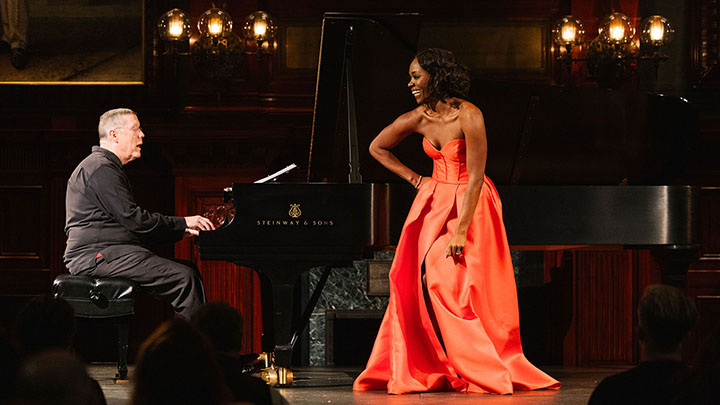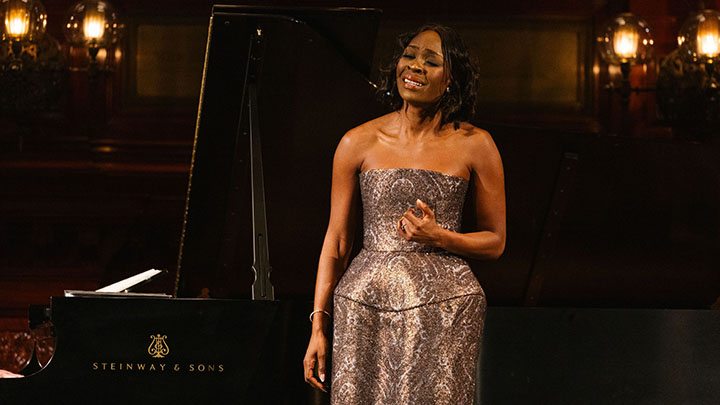
That music came courtesy of Trinidadian soprano Jeanine De Bique, making her Armory debut, and pianist Warren Jones in a program encompassing French mélodie, American art songs, and Caribbean folk songs with some brief forays into the Baroque repertoire. In her opening remarks, De Bique explained that she wanted the program to explore the “silent stories” between composers and the poets whose texts they set to song: how the lives of these artists mirror each other and emerge through the meeting of their art.
Despite having made her mark in the works of Handel, De Bique does not possess the prototypical Baroque specialist voice: her mulberry tinged soprano is far richer and more intense than, say, your Lucy Crowe-types, but she has an equally as adept grasp of Baroque style, wielding ample dexterity and a judicious control over her vibrato. Her engagements this past year have seen her branch out into works by Massenet and George Benjamin. This past January, she sang her first Micaëla in the Liceu’s Carmen. Her performance here fully justified that shift into “heavier repertoire.”
Indeed, the program seemed to be a blueprint for her recent career moves. It opened with Henry Purcell’s “The Blessed Virgin’s Expostulation,” a scena from the Harmonia Sacra with text by Nahum Tate in a setting by Benjamin Britten. Drawn from a passage in Luke, the piece, which largely consists of extended recitativo arioso, depicts the anguish of the Virgin Mary after she looses sight of the adolescent Jesus in the temple in Jerusalem. De Bique’s careful attention to text brought out both the tenderness and the anxiety in this prime example of Purcell’s ability to plumb the human in the sacred.
We then settled in for selections from the Rondels of Reynaldo Hahn featuring the words of Charles, Duke of Orléans, a foremost medieval poet, and Théodore de Banville, an important influence on the Symbolist movement. The richness of De Bique’s tone melded with Hahn’s lush melodies, and Jones’s shading made the accompaniment shimmer. The pair’s willingness to experiment some forceful dynamic shifts brought out rather some fascinating tensions in “Les étoiles,” a piece that I have often heard performed in a floating hush. Here, they shaped a decidedly dramatic arc out this paean to the night sky, lending the piece a sense of cosmic longing rather than making it a simple exercise in prettiness. Yet in other places in the Hahn, I found that both De Bique and Jones would have benefited from pulling back, as the intensity of their approach (especially in such an intimate space) sometimes obscured the melodies’ elegant simplicity. This was not the case, however, in “L’air,” where DeBique softened and accented her phrasing with careful moments of breathlessness, spooling out her sound into sublime quietness. She also had considerable coquettish charm throughout the program, but especially in “Quand je fus pris au pavillon.”
The “silent stories” framing became clearer in the transition to the Five Songs of Laurence Hope by Black American composer Henry T. Burleigh. Perhaps most famous for introducing Dvorák to African American spirituals during his sojourn in New York, Burleigh worked as a baritone, an arranger, and a music editor for Ricordi, but struggled to publish his original compositions in the United States. Similarly, the Anglo-Indian Hope, born Adela Florence Cory, had difficulty publishing her overtly erotic, orientalist poetry until she adopted a male pseudonym. As Jones put it in his introductory remarks (the soprano was taking a drink of water), these are the songs of “a composer who could not be heard and a poet who could not be read.”
Burleigh’s roiling melodic structures and chord progression aptly paint the exotic sensuality of Hope’s poetry, and Jones’s agitated playing leaned into this effect. De Bique’s keen dramatic sensibilities were fully attuned with the romantic excesses of both the text and its musical setting. During “Kashmiri Song,” wherein the agonized narrator reminisces upon the touch of their departed lover, she pressed her fingertips against her lips as she sang of the “pale hands, pink tipped, like Lotus buds that float/On those waters where we used to dwell,” evoking amorous abandon and grief in equal measure. She unleashed some radiant top notes in the climatic sections of “Till I Wake,” before receding into a haunting whisper.
De Bique returned for the second half of the program having exchanged a black empire gown for a vibrant tangerine number for the musical kookiness that was about to ensue: Les Illuminations by Britten, based off the suite of prose poems of the same name by Arthur Rimbaud. The most obvious biographical crossover between the men is their shared homosexuality, but Britten tellingly turned to Rimbaud’s phantasmagoric evocations of urban modernity in the midst of his own flirtation with la vie de bohème in Brooklyn. The resulting cycle is a carnivalesque romp through many of the Belle Époque idioms we had heard in the earlier Hahn songs.
De Bique, who up until this point had not used a score, explained that she was still discovering this very difficult piece. Yet I did not detect any lack of confidence in her execution. She navigated the piece’s erratic tonal and register shifts with style, infusing the more rambunctious passages of “Villes” and “Parade” with a comic esprit. Though the staccati in “Marine” were labored, she had fully corrected course by “Being Beauteous,” where she balanced a silvery inflection at her top with an earthy, chanteuse-like approach to her phrasing. The overall success of her performance in this piece, however, was thanks largely to her rapport with Jones; they listened intently to each other and built upon each other’s momentum to make the transitions between the songs feel seamless.
The program closed with four folk songs from across the Caribbean and Trinidadian musician André Tanker’s calypso “Morena Osha.” She brought a soubrette sweetness and sass to these songs, animating the conversational aspect of many of the lyrics and swaying along with the music. (If the Met ever decides to revive its dance-heavy David McVicar production of Giulio Cesare, I can think of no better casting for its Cleopatra.) Her gentle, pliant singing made “Cutie Pak,” a patois song from the perspective of a grounded child, sweetly mischievous.
For her encores, she delivered a rousing account of the spiritual “Ain’t that good news” as well as two bravura showpieces: Mozart’s “Alleluia” and, speaking of Cleopatra, Carl Heinrich Graun’s “Tra le procelle assorto” from his opera Cleopatra e Cesare. Being in such charming company was certainly not a bad way to spend Valentine’s Day.
Photos: Da Ping Luo



























Comments